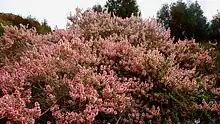Salsola oppositifolia
Salsola oppositifolia is a halophyte shrub native to the Mediterranean Basin.[1]
| Salsola oppositifolia | |
|---|---|
 | |
| Scientific classification | |
| Kingdom: | Plantae |
| Clade: | Tracheophytes |
| Clade: | Angiosperms |
| Clade: | Eudicots |
| Order: | Caryophyllales |
| Family: | Amaranthaceae |
| Genus: | Salsola |
| Species: | S. oppositifolia |
| Binomial name | |
| Salsola oppositifolia | |
| Synonyms[1] | |
|
Seidlitzia oppositifolia (Desf.) Iljin | |
Description
This annual, woody plant can grow into shrubs up to 2 m tall. It has cylindrical-linear and opposed leaves. The flowers, which bloom from May to October, are hermphrodyte and have a size of 1 cm.[2]
Taxonomy
Salsola oppositifolia was first described by René Louiche Desfontaines and published in Flora Atlantica 1: 219. 1798.[3]
Uses
This plant has been historically used, along with other Salsola species, as a source of soda ash, in the manufacture of lye and soaps.[2]
References
- "Salsola oppositifolia Desf. | Plants of the World Online | Kew Science". Plants of the World Online. Retrieved 15 August 2022.
- "Salsola oppositifolia". www.florandalucia.es. Retrieved 15 August 2022.
- "Tropicos | Name - Salsola oppositifolia Desf". legacy.tropicos.org. Retrieved 15 August 2022.
External links
 Data related to Salsola oppositifolia at Wikispecies
Data related to Salsola oppositifolia at Wikispecies Media related to Salsola oppositifolia at Wikimedia Commons
Media related to Salsola oppositifolia at Wikimedia Commons
This article is issued from Wikipedia. The text is licensed under Creative Commons - Attribution - Sharealike. Additional terms may apply for the media files.